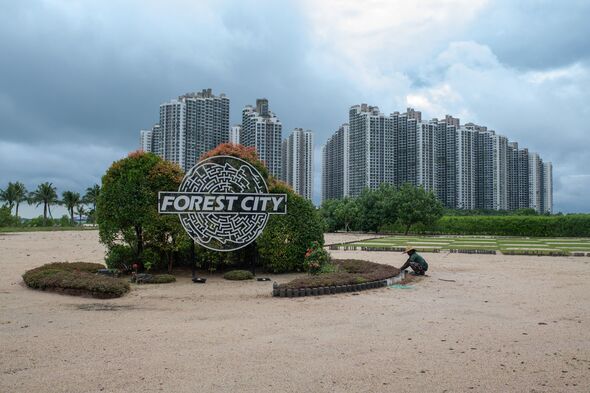Forest City in Malaysia was a $100bn (£78bn) investment by China into the country to create a paradise for 700,00 people but now sits eerily empty after a profound property crisis.
The sprawling housing complex is located in Johoh, southern Malaysia, and was built by China’s largest property developer, Country Garden, as part of their Belt and Road Initiative in 2016.
At this time, China was experiencing a property boom and so developers were keen to capitalise on this, borrowing staggering sums of money to build homes for middle-class buyers both on home soil and abroad.
This manifested in Forest City – an eco-friendly complex that boasts restaurants, bars, offices, a golf course, and a waterpark.
However, eight years and one property crisis later, the project stands with just 9,000 inhabitants out of the nearly one million it could house.
Forest City has not even been fully finished yet, with only 15 percent actually built and just over one percent of the total development occupied.
Now, Country Garden is $200bn (£153bn) in debt with relatively little to show for it as the few who do live in its megaproject dream of getting out.
Resident Joanne Kaur, who rents a flat with her husband, told the BBC: “This place is eerie. Even during the day, when you step out of your front door, the corridor is dark.
“I feel sorry for people who actually invested and bought a place here. If you were to Google ‘Forest City’, it’s not what you see here today. It should be the project that was promised to the people, but that’s not what it is.”
The location was perhaps the first mistake, as Forest City was constructed on isolated manmade islands far away from the nearest major city of Johor Bahru.
Three weeks ago, Malaysian Prime Minister Anwar Ibrahim launched a zero percent on family officers, amongst other schemes, tax to attract wealthy people to the newly-created Forest City Special Financial Zone (SFZ).
Second Finance Minister Amir Hamzah Azizan announced these plans. He said: “Supported by good infrastructure, a competitive talent pool, robust common law practices and effective governance, opportunities abound for family offices.”
There will also be a concessionary rate of corporate tax between zero and five percent and a special rate of income tax of 15 percent for “knowledge workers” and Malaysians working in the SFZ.
In the finance and business sector, there will be a special tax rate of five percent for financial technology, foreign payment system operators, and global business services.
